
Miguel Gregorio de la Luz Atenógenes Miramón y Tarelo, known as Miguel Miramón, was a Mexican conservative general who disputed the Mexican presidency with Benito Juarez at the age of twenty seven during the Reform War, serving between February 1859 and December 1860. He was the first Mexican president to be born after the Mexican War of Independence.

Félix María Zuloaga Trillo (1813–1898) was a Mexican conservative general and politician who played a key role in the outbreak of the Reform War in early 1860, a war which would see him elevated to the presidency of the nation. President Zuloaga was unrecognized by and fought against the liberals supporters of President Benito Juarez.
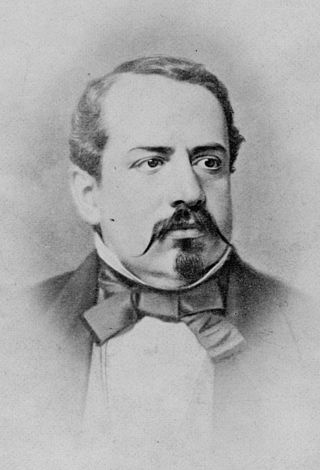
Manuel Robles Pezuela was a military engineer, military commander, and eventually interim president of Mexico during a civil war, the War of Reform, being waged between conservatives and liberals, in which he served as president of the Conservatives, in opposition to President Benito Juarez, head of the Liberals.
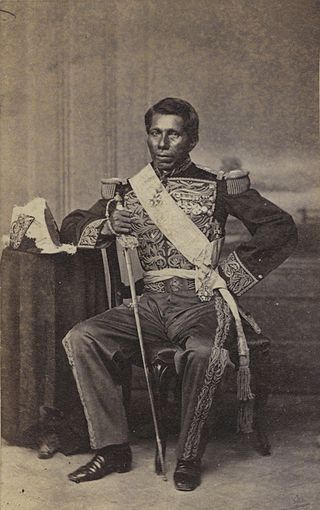
José Tomás de la Luz Mejía Camacho, better known as Tomás Mejía, was a Mexican soldier of Otomi background, who consistently sided with the Conservative Party throughout its nineteenth century conflicts with the Liberals.
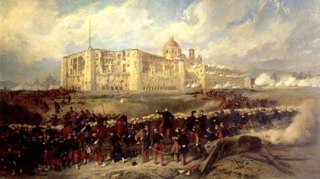
The second French intervention in Mexico, also known as the Second Franco-Mexican War (1861–1867), was a military invasion of the Republic of Mexico by the French Empire of Napoleon III, purportedly to force the collection of Mexican debts in conjunction with Great Britain and Spain. Mexican conservatives supported the invasion, since they had been defeated by the liberal government of Benito Juárez in a three-year civil war. Defeated on the battlefield, conservatives sought the aid of France to effect regime change and establish a monarchy in Mexico, a plan that meshed with Napoleon III's plans to re-establish the presence of the French Empire in the Americas. Although the French invasion displaced Juárez's Republican government from the Mexican capital and the monarchy of Archduke Maximilian was established, the Second Mexican Empire collapsed within a few years. Material aid from the United States, whose four-year civil war ended in 1865, invigorated the Republican fight against the regime of Maximilian, and the 1866 decision of Napoleon III to withdraw military support for Maximilian's regime accelerated the monarchy's collapse.
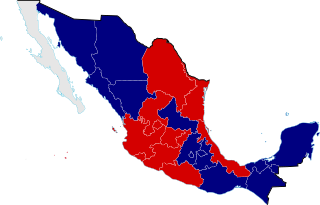
The Reform War, or War of Reform, also known as the Three Years' War, and the Mexican Civil War, was a complex civil conflict in Mexico fought between Mexican liberals and conservatives with regional variations over the promulgation of Constitution of 1857. It has been called the "worst civil war to hit Mexico between the War of Independence of 1810–21 and the Revolution of 1910–20". Following the liberals' overthrow of the dictatorship of conservative Antonio López de Santa Anna, liberals passed a series of laws codifying their political program. These laws were incorporated into the new constitution. It aimed to limit the political power of the executive branch, as well as the political, economic, and cultural power of the Catholic Church. Specific measures were the expropriation of Church property; separation of church and state; reduction of the power of the Mexican Army by elimination of their special privileges; strengthening the secular state through public education; and measures to develop the nation economically.
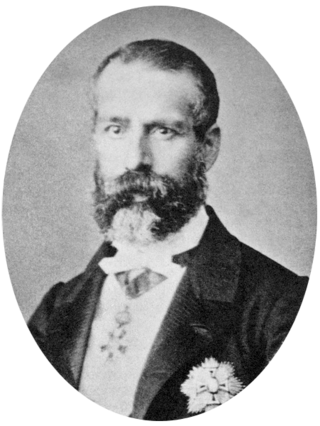
Leonardo Márquez Araujo was a conservative Mexican general. He led forces in opposition to the Liberals led by Benito Juárez, but following defeat in the Reform War was forced to guerrilla warfare. Later, he helped the French in their intervention to help restore the conservative cause. However, their defeat forced him into exile for most of the rest of his life.
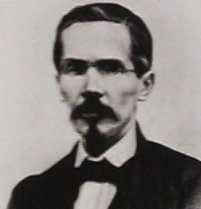
José Santos Degollado Sánchez was a Mexican Liberal politician and military leader. He was raised by a priest in Michoacán and worked twenty years in the cathedral in Morelia. He became a Federalist in 1836 and entered politics in 1845 when he was elected to the Michoacán legislature in 1845. He replaced his close associate Melchor Ocampo as governor of Michoacán 27 March - 6 July 1848. He joined the Revolution of Ayutla. He became governor of Jalisco when the liberals successfully ousted Antonio López de Santa Anna. As with a number of rising Liberals, Degollado was not formally trained as a soldier, but gained military experience in the Revolution of Ayutla. He later fought for Benito Juárez's government. During Benito Juárez's presidency he served as Secretary of War and Navy and as Secretary of External Affairs. Degollado was a close friend of Guillermo Prieto and of Melchor Ocampo and fought by his side in many battles. Degollado was a resilient military leader, experiencing defeat after defeat in the Reform War that pitted the constitutional liberal government of Juárez against the conservatives. The army fielded by the conservatives was larger and better trained than the liberals' forces, but the liberals managed to achieve a stalemate for over two years and in the end triumphed. The liberal victory was not achieved by Degollado, who was in disgrace at the end of the war. Degollado was known as the "hero of defeats" for his ability to raise yet another army after yet another defeat. An experienced general who joined the liberal cause, General López Uraga, gave President Juárez a scathing assessment of the liberal army and Degollados's command of it. He had given everything he could to achieve a liberal victory, but his record of defeats meant his men were demoralized although continued to be loyal to him.

The siege of Querétaro was the culminating battle of the Second French intervention in Mexico and the Second Mexican Empire. It took place between Republican and Imperial armies from 6 March to 15 May 1867.

The Battle of Silao took place on 10 August 1860 in the vicinity of Silao in Guanajuato state, Mexico, between elements of the liberal army, under the command of General Jesús González Ortega and Ignacio Zaragoza with a force of 8,000 men and elements of the conservative army commanded General Miguel Miramón by commanding an army of 3,282 during the War of Reform. The battle was a liberal victory. General Miramón was almost captured, but escaped in the disorder caused by the Republican artillery, abandoning artillery, ammunition and weapons.
The Battle of Celaya took place on 8 and 9 March 1858 in Celaya, an early battle of the Reform War. Fought between elements of the liberal army, under General Anastasio Parrodi, governor of Jalisco, and elements of the conservative army, commanded by General Luis G. Osollo. The victory was won by the conservative side and corresponded to the first liberal defeat. The defeat made General Parrodi fell back to Salamanca, where the next battle was fought and won by the conservatives.
The Battle of Atenquique took place on 2 July 1858, during the Reform War, in the vicinity of the canyon Atenquique near the Nevado de Colima in the state of Jalisco, Mexico. The conflict was between elements of the liberal army, under General Santos Degollado, and conservative troops, commanded by General Miguel Miramón. The battle caused heavy losses for both sides. Some consider the result undecided, although most historians qualify it as a win with a clear advantage for conservatives: Miramón's troops obtained control of the state of Jalisco. Additionally, Degollado became known as the Hero of the Defeats, for his troops' constant failures.
The Battle of Ahualulco took place on 29 September 1858 during the War of Reform, near the town of Ahualulco in the state of San Luis Potosí, Mexico, between elements of the liberal army, commanded by the Generals Santiago Vidaurri, Juan Zuazua and Francisco Naranjo and conservative army troops commanded by General Miguel Miramón and Leonardo Márquez. Vidaurri's army was defeated and the conservatives won the battle as the result. The liberals suffered 672 casualties and 91 prisoners. It is considered by some to be one of the most brilliant triumphs of Miramón.
The Battle of San Joaquín in the War of Reform took place on 26 December 1858 in the municipality of Cuauhtémoc, between elements of the liberal army, under General Santos Degollado, and elements of the conservative army, commanded by General Miguel Miramón.
The Battle of Estancia de las Vacas took place on November 13, 1859 in the vicinity of Estancia Cows in the state of Querétaro, Mexico, between elements of the liberal army under General Santos Degollado and elements of the conservative army commanded by General Miguel Miramón during the Reform War. The conservatives inflicted a defeat despite being outnumbered two to one by the liberals.
The Battle of Loma Alta took place on April 24, 1860 in the vicinity of Loma Alta in the state of Zacatecas, Mexico, between elements of the liberal army of the National Guard of San Luis Potosí and Zacatecas, under General Jose Lopez Uraga and elements of the conservative army commanded by General Romulo Diaz De La Vega during the War of Reform.

The Battle of Calpulalpan took place on December 22, 1860 during the War of Reform in the vicinity of the community of San Miguel de la Victoria in the municipality of Jilotepec de Abasolo in the State of Mexico, Mexico. It would be the last battle of the War of Reform (1858-1860).
The Battle of Tacubaya took place on 11 April 1859 near the ancient village of Tacubaya in today's Mexico City, Mexico, between elements of the liberal army, under General Santos Degollado and elements of the conservative army commanded by General Leonardo Márquez during the War of Reform. Victory fell to the conservative side, and both armies suffered heavy casualties. After the battle General Miguel Miramón ordered Márquez to shoot the captured liberal chiefs and officers, including the head of the Army Medical Corps and other liberal doctors. The executions came to be known as the Massacre of Tacubaya, and both this and the battle itself earned Leonardo Márquez the nickname of "Tiger of Tacubaya".
The Battle of Salamanca took place between 9 and 10 March 1858 in Salamanca, during Mexico's War of Reform (1858-1860). Elements of the liberal army, under General Anastasio Parrodi, governor of the Jalisco, fought with Generals Leandro Valle, Santos Degollado, and Mariano Moret, against conservatives, commanded by General Luis G. Osollo. Osollo's army had some 5,000 men, including Generals Miguel Miramón and Tomás Mejía, Francisco García Casanova. The conservatives won, handed the liberals a second liberal defeat, and forced them to retreat to Guadalajara from Guanajuato.

José Miguel Pascual Negrete Novoa, commonly known as Miguel Negrete was a 19th-century Mexican Major General. He participated in the many Mexican Civil Wars, as well as the Mexican–American War and the Second French intervention in Mexico. Negrete was also the Governor of Puebla from October 13, 1863, to November 4, 1863, and the Minister of War and Navy of Mexico from March 16, 1864 to August 23, 1865.











